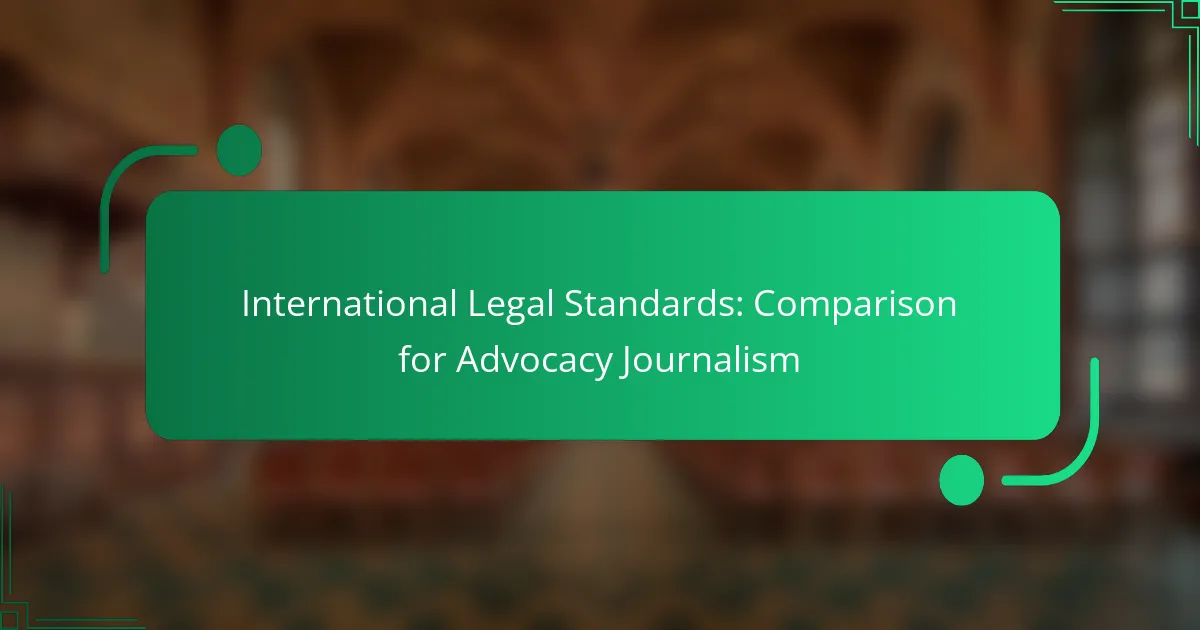Advocacy journalism plays a crucial role in promoting transparency and accountability, guided by key international legal standards that protect freedom of expression and the right to information. These frameworks empower journalists to operate without undue interference, enabling them to report on matters of public interest effectively. However, challenges persist, as restrictions on freedom of expression can impede their ability to fulfill this essential function.
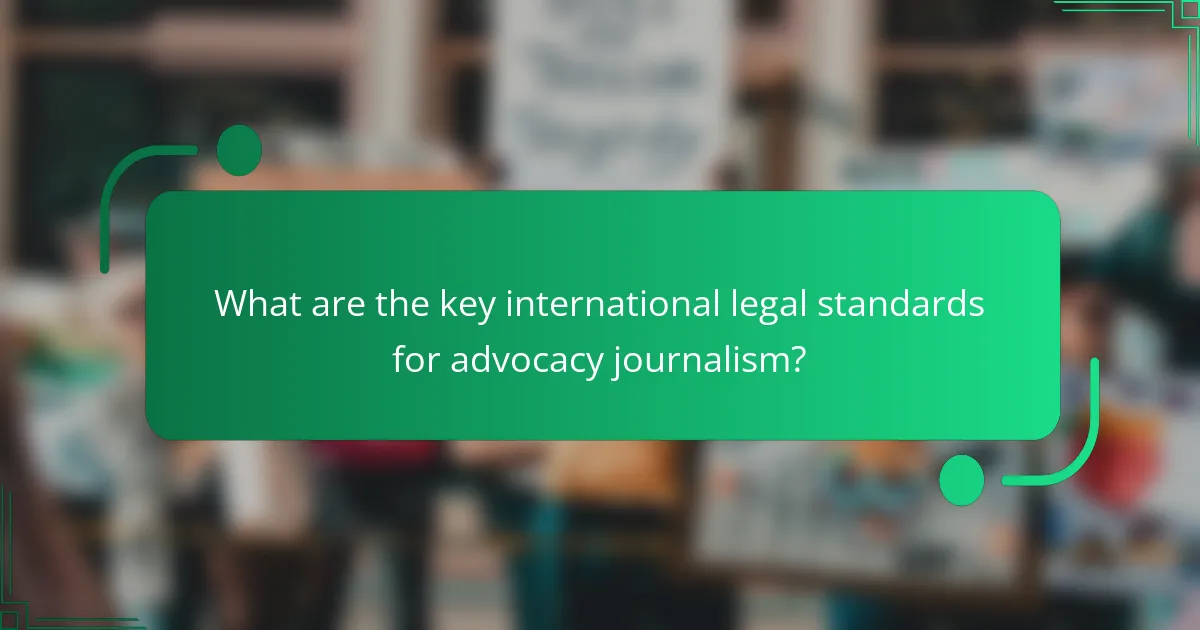
What are the key international legal standards for advocacy journalism?
Key international legal standards for advocacy journalism include frameworks that protect freedom of expression and the right to information. These standards guide journalists in their work, ensuring they can operate without undue interference while holding power accountable.
Universal Declaration of Human Rights
The Universal Declaration of Human Rights (UDHR) is a foundational document that asserts the right to freedom of opinion and expression. Article 19 specifically emphasizes that everyone has the right to seek, receive, and impart information and ideas through any media, regardless of frontiers.
For advocacy journalists, the UDHR serves as a critical reference point, reinforcing the importance of transparency and accountability in governance. It encourages journalists to report on issues affecting human rights without fear of censorship or retaliation.
International Covenant on Civil and Political Rights
The International Covenant on Civil and Political Rights (ICCPR) expands on the principles of the UDHR, particularly in Article 19, which protects the right to freedom of expression. This includes the freedom to hold opinions without interference and to seek and receive information.
Advocacy journalists should be aware that while the ICCPR allows for certain restrictions on freedom of expression, such limitations must be provided by law and necessary for respecting the rights of others or protecting national security. Understanding these nuances is essential for responsible reporting.
European Convention on Human Rights
The European Convention on Human Rights (ECHR) includes Article 10, which guarantees the right to freedom of expression, including the freedom to receive and impart information. This legal framework is particularly relevant for journalists operating within European countries.
Journalists should note that the ECHR allows for restrictions on this freedom, but only if they are justified as necessary in a democratic society. This standard encourages a balance between freedom of expression and other societal interests, such as public order and national security.
American Convention on Human Rights
The American Convention on Human Rights (ACHR) enshrines the right to freedom of thought and expression in Article 13. This includes the right to seek, receive, and disseminate information and ideas of all kinds.
For advocacy journalism in the Americas, the ACHR emphasizes that any restrictions on freedom of expression must be established by law and necessary for a legitimate aim. This framework supports journalists in their role as watchdogs of democracy, promoting transparency and accountability.
African Charter on Human and Peoples’ Rights
The African Charter on Human and Peoples’ Rights (ACHPR) recognizes the right to freedom of expression in Article 9. This includes the right to receive and impart information, which is crucial for advocacy journalism across the African continent.
Journalists should be mindful that while the Charter promotes freedom of expression, it also highlights the need to respect the rights of others and maintain public order. Understanding these provisions can help journalists navigate the complexities of reporting in various African nations.
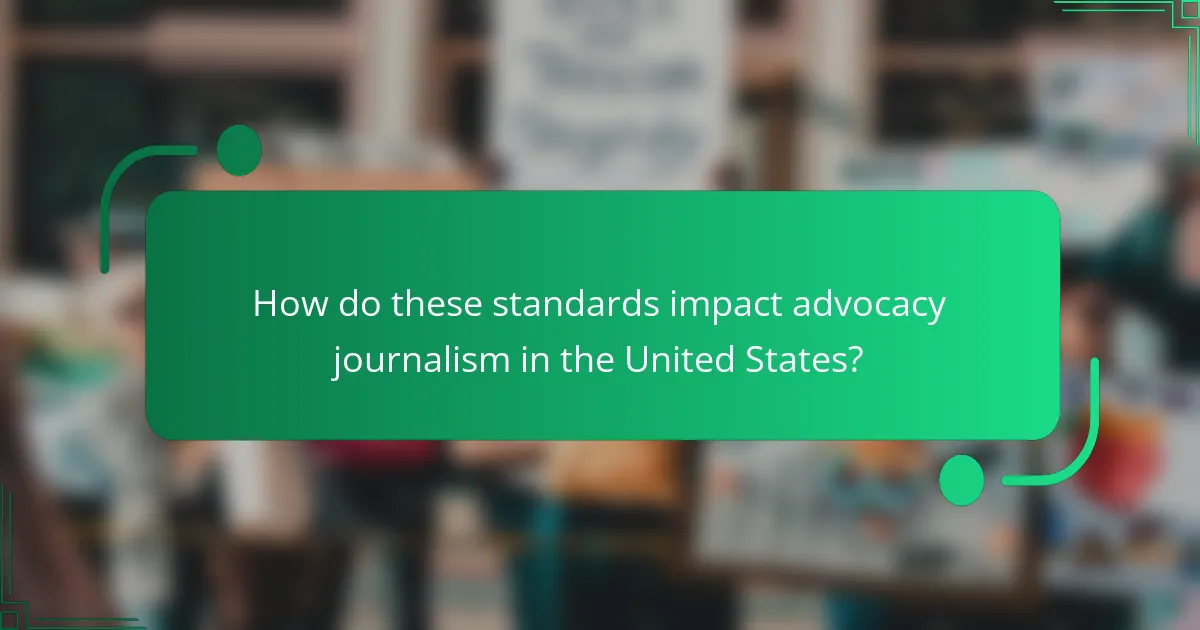
How do these standards impact advocacy journalism in the United States?
International legal standards significantly influence advocacy journalism in the United States by shaping the legal framework within which journalists operate. These standards help protect freedom of expression and ensure that journalists can report on issues of public interest without undue interference.
First Amendment protections
The First Amendment of the U.S. Constitution provides robust protections for freedom of speech and press, which are crucial for advocacy journalism. This amendment prohibits Congress from making laws that infringe upon the rights to free speech, allowing journalists to express opinions and report on controversial topics without fear of censorship.
However, these protections are not absolute. Journalists must navigate challenges such as libel laws and national security concerns, which can limit their ability to report freely. Understanding these nuances is essential for effective advocacy journalism.
Legal precedents in journalism
Legal precedents play a vital role in shaping the landscape of advocacy journalism in the U.S. Landmark cases, such as New York Times Co. v. Sullivan, established the “actual malice” standard, which protects journalists from defamation claims when reporting on public figures. This precedent encourages more aggressive reporting on issues that matter to the public.
Additionally, cases like Branzburg v. Hayes highlight the tension between journalistic privilege and the obligation to testify in criminal cases. Journalists must be aware of these precedents to effectively advocate for their rights and the rights of those they report on.

What are the challenges faced by advocacy journalists under international law?
Advocacy journalists encounter significant challenges under international law, primarily due to restrictions on freedom of expression and the potential for legal consequences. These obstacles can hinder their ability to report on critical issues and hold power accountable.
Censorship issues
Censorship remains a major hurdle for advocacy journalists, often imposed by governments or private entities aiming to suppress dissenting voices. This can manifest through direct bans on certain topics, the removal of content, or intimidation tactics against journalists.
In many countries, laws regarding national security or public order can be misused to justify censorship. For instance, journalists may face restrictions on reporting about protests or human rights abuses, limiting their ability to inform the public.
Legal repercussions for reporting
Advocacy journalists may face serious legal repercussions, including lawsuits, fines, or even imprisonment for their reporting. Lawsuits can arise from defamation claims or violations of privacy, particularly when reporting on powerful individuals or organizations.
In some jurisdictions, journalists may be charged under vague laws that criminalize their work, such as anti-terrorism or sedition laws. This creates a chilling effect, discouraging journalists from pursuing important stories due to fear of legal consequences.
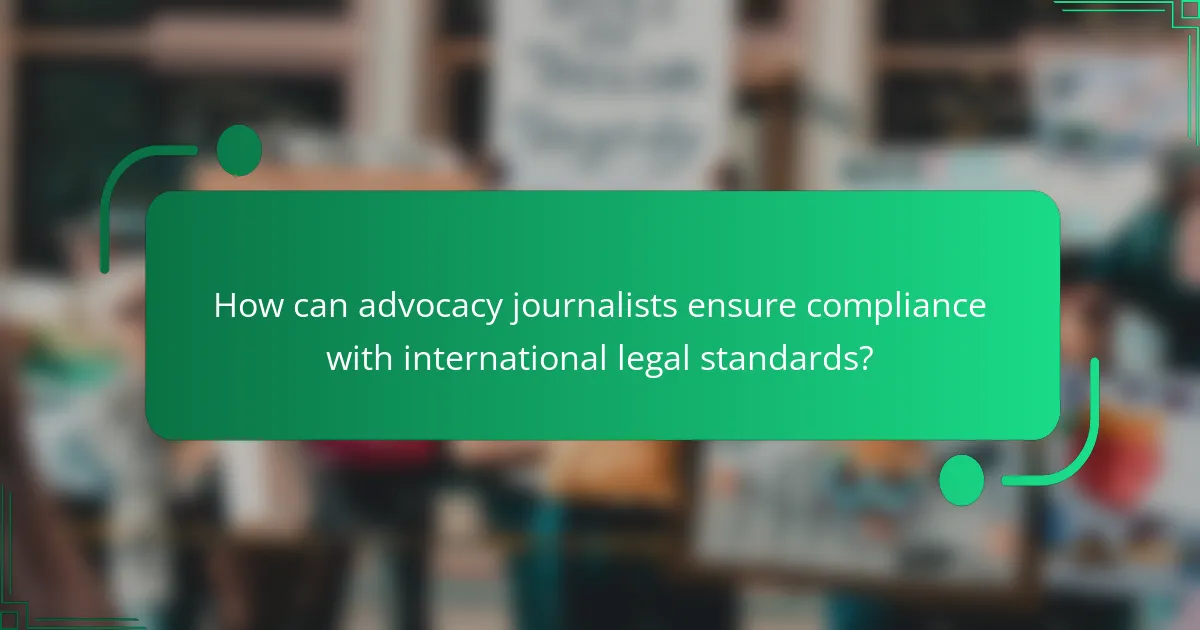
How can advocacy journalists ensure compliance with international legal standards?
Advocacy journalists can ensure compliance with international legal standards by understanding relevant laws and regulations, implementing best practices, and continuously educating themselves on legal matters. This proactive approach helps mitigate risks associated with reporting and promotes ethical journalism.
Training on legal frameworks
Training on legal frameworks is essential for advocacy journalists to navigate the complexities of international law. This training should cover topics such as freedom of expression, defamation laws, and privacy rights, which vary significantly across jurisdictions.
Workshops, online courses, and seminars can provide valuable insights into these legal standards. Journalists should aim to participate in at least one training session annually to stay updated on changes in laws that may affect their reporting.
Collaboration with legal experts
Collaboration with legal experts is crucial for advocacy journalists to ensure their work adheres to international legal standards. Engaging with lawyers who specialize in media law can provide journalists with tailored advice on specific cases or issues they encounter.
Establishing a network of legal professionals can facilitate quick consultations when legal questions arise. Journalists should consider creating partnerships with law schools or legal aid organizations to access resources and expertise.
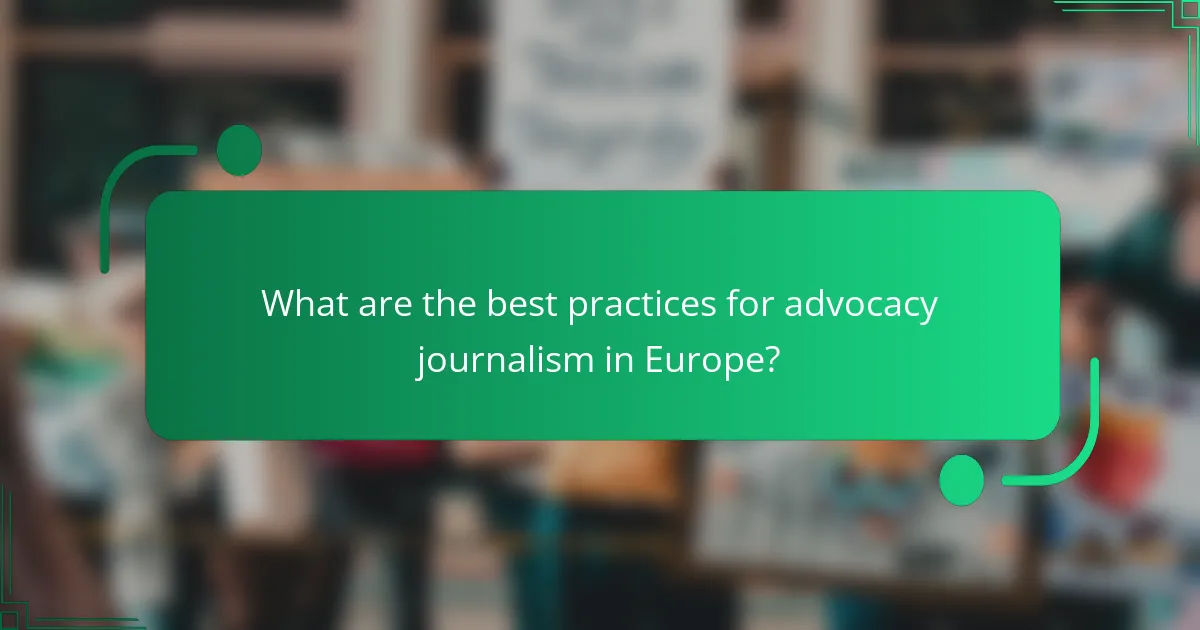
What are the best practices for advocacy journalism in Europe?
Advocacy journalism in Europe should prioritize ethical standards, transparency, and compliance with legal frameworks. By adhering to established guidelines, journalists can effectively promote social change while maintaining credibility and trust with their audience.
Adhering to GDPR regulations
Compliance with the General Data Protection Regulation (GDPR) is crucial for advocacy journalists in Europe. This regulation mandates that personal data must be processed lawfully, transparently, and for specific purposes. Journalists should ensure they have a legal basis for data collection, such as consent or legitimate interest.
Additionally, journalists must inform individuals about how their data will be used and provide options for them to access or delete their information. Failing to comply with GDPR can result in significant fines, which can reach up to 4% of annual global turnover or €20 million, whichever is higher.
Understanding local media laws
Each European country has its own media laws that can significantly impact advocacy journalism. Familiarizing oneself with these laws is essential to avoid legal pitfalls. For instance, defamation laws vary widely; some countries have strict liability standards, while others require proof of intent.
Journalists should also be aware of regulations regarding hate speech and misinformation, as these can lead to legal consequences. It’s advisable to consult local legal experts or resources to ensure compliance with specific media laws in the country of operation.
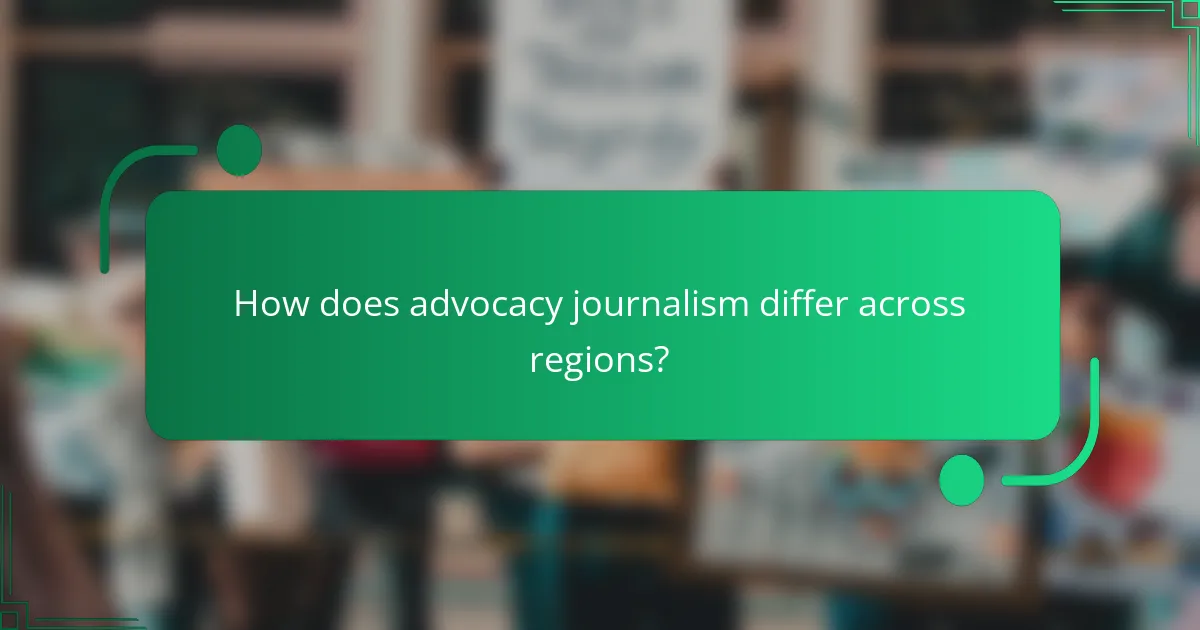
How does advocacy journalism differ across regions?
Advocacy journalism varies significantly across regions due to differing legal standards, cultural contexts, and political environments. These factors shape how journalists approach issues, the risks they face, and the effectiveness of their advocacy efforts.
Comparative analysis of legal frameworks
Legal frameworks governing advocacy journalism differ widely, influencing the freedom and limitations journalists encounter. In countries with strong press protections, such as those in Western Europe, journalists can operate with greater autonomy, while in regions with restrictive laws, like parts of the Middle East, they may face severe consequences for their work.
For instance, the European Union enforces regulations that support freedom of expression, while countries like Russia impose strict laws that limit journalistic activities. Understanding these legal landscapes is crucial for journalists to navigate their advocacy effectively.
Regional case studies
In North America, advocacy journalism often thrives in a relatively open environment, allowing for impactful reporting on social issues, such as racial justice and climate change. However, journalists still face challenges, including misinformation and political backlash.
Conversely, in regions like Southeast Asia, journalists advocating for human rights may encounter significant risks, including censorship and imprisonment. A notable case is the treatment of journalists in Myanmar, where reporting on political dissent can lead to severe repercussions.

What emerging trends are shaping advocacy journalism globally?
Emerging trends in advocacy journalism include the rise of digital platforms, increased audience engagement, and a focus on transparency and accountability. These trends are reshaping how journalists report on legal standards and advocate for social change, making the field more dynamic and responsive to public needs.
Impact of digital media on legal standards
Digital media has significantly influenced legal standards by enabling faster dissemination of information and broader access to diverse viewpoints. This shift allows advocacy journalists to reach wider audiences and engage in real-time discussions about legal issues, enhancing public awareness and participation.
However, the rapid spread of information can lead to challenges such as misinformation and the need for fact-checking. Journalists must navigate these pitfalls by verifying sources and ensuring accuracy to maintain credibility and uphold legal standards.
For example, social media platforms often serve as both a source of information and a battleground for legal debates. Advocacy journalists should leverage these platforms to amplify their messages while remaining vigilant about the potential for misinterpretation or backlash against their reporting.
